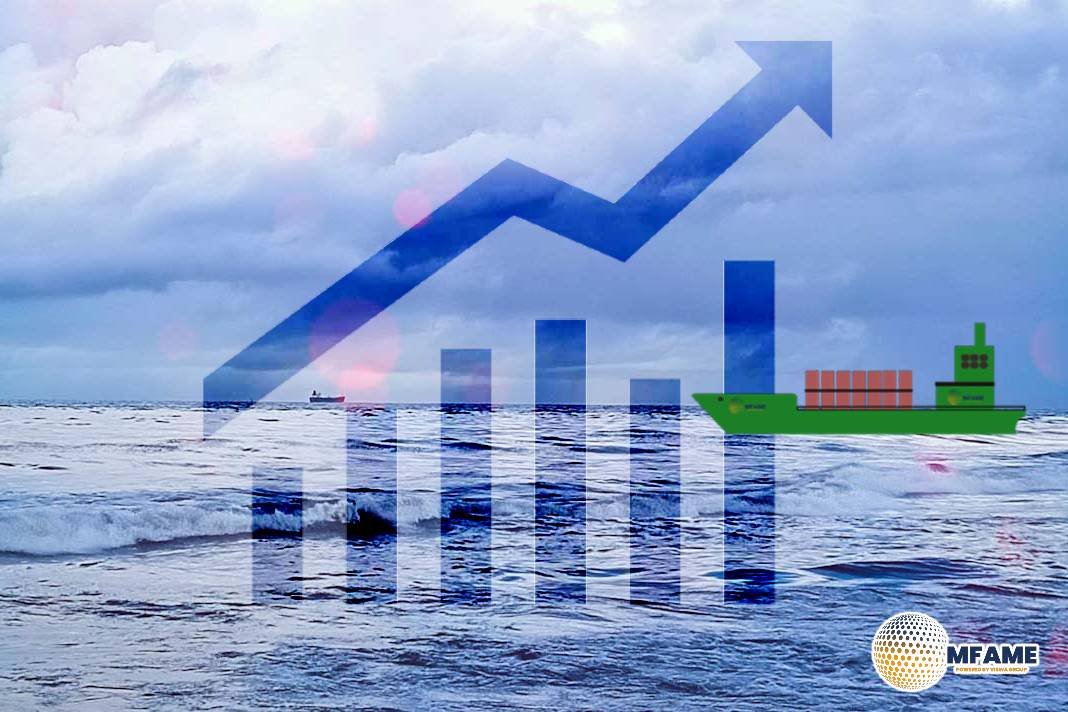 Shares of major European maritime shippers such as Maersk and Hapag-Lloyd have substantially surged in value due to Red Sea disruptions, with increased costs passed on as higher freight rates. Goldman Sachs and J.P Morgan analysts discuss whether this trend is likely to last, says an article published on euro news website.
Shares of major European maritime shippers such as Maersk and Hapag-Lloyd have substantially surged in value due to Red Sea disruptions, with increased costs passed on as higher freight rates. Goldman Sachs and J.P Morgan analysts discuss whether this trend is likely to last, says an article published on euro news website.
Summary
- Major European maritime shippers like Maersk and Hapag-Lloyd have experienced substantial rallies in their stock values due to ongoing disruptions in the Red Sea.
- The surge in share values began when a Houthi missile targeted a Maersk vessel, prompting major shipping companies to avoid the region and use longer routes, leading to increased transit times and operational costs.
- The rerouting strategy has significant implications for shipping economics, with major companies raising rates by up to 100% to account for the higher costs and extended journey times.
- Spot rates for forty-foot-equivalent (FFE) containers have seen a dramatic spike, rising from about $2,000 in early December to over $5,000 by January 4th.
- Financial analysts are closely monitoring the situation. While Goldman Sachs anticipates further rises in freight rates, J.P. Morgan views the disruption as a temporary boost unlikely to provide lasting benefits to earnings.
Surge In Maritime Shippers Shares
In recent weeks, major European maritime shippers like Maersk and Hapag-Lloyd have experienced substantial rallies in their stock values, primarily attributed to ongoing disruptions in the Red Sea caused by Houthi militant activities off the Yemen coast.
Root Of The Rally
The surge in share values, notably a 30% increase for Denmark’s Maersk and a 55% rise for Germany’s Hapag-Lloyd since mid-December, began when a Houthi missile targeted a Maersk vessel. This event underscored the heightened risks of navigating the Red Sea, prompting major shipping companies to avoid the region. As a result, longer routes, such as around the Cape of Good Hope, are being utilized to bypass the troubled area, leading to increased transit times and operational costs.
Impact On Shipping Economics
The rerouting strategy has significant implications for shipping economics, with major companies like unlisted French group CMA CGM raising rates by up to 100% to account for the higher costs and extended journey times. Spot rates for forty-foot-equivalent (FFE) containers have seen a dramatic spike, rising from about $2,000 in early December to over $5,000 by January 4th, driven by heightened demand and constrained supply.
Analyst Perspectives And Market Outlook
Financial analysts are closely monitoring the situation. Nordnet’s Per Hanses believes that the rate increases should adequately compensate for the heightened risks and costs associated with the new routes.
Goldman Sachs anticipates further rises in freight rates, with 30% of global containerized trade affected by the disruptions as of late December. However, J.P. Morgan takes a more cautious stance, downgrading Maersk to “neutral,” viewing the disruption as a temporary boost unlikely to provide lasting benefits to earnings.
Long-Term Outlook And Industry Challenges
While some analysts foresee sustained benefits from the disruptions, J.P. Morgan predicts a return to the industry’s pre-disruption state, characterized by weak fundamentals and oversupply issues once the Red Sea situation stabilizes. Before the attacks, companies like Maersk were already facing challenges such as a subdued economic outlook, job cuts, and warnings of weak prices and rising costs.
Monitoring Developments For Long-Term Impact
As the situation evolves, investors and industry stakeholders need to closely monitor developments and assess potential long-term impacts on the global shipping industry. Cascading effects on Europe’s economic growth and inflation should also be considered amid the evolving landscape of maritime disruptions.
Did you subscribe to our daily Newsletter?
It’s Free! Click here to Subscribe
Source: Euronews























Normally I do not read article on blogs however I would like to say that this writeup very forced me to try and do so Your writing style has been amazed me Thanks quite great post
The reputation of the website will surely see an improvement in the near future as a result of the high-quality content and the active involvement of the administrator.